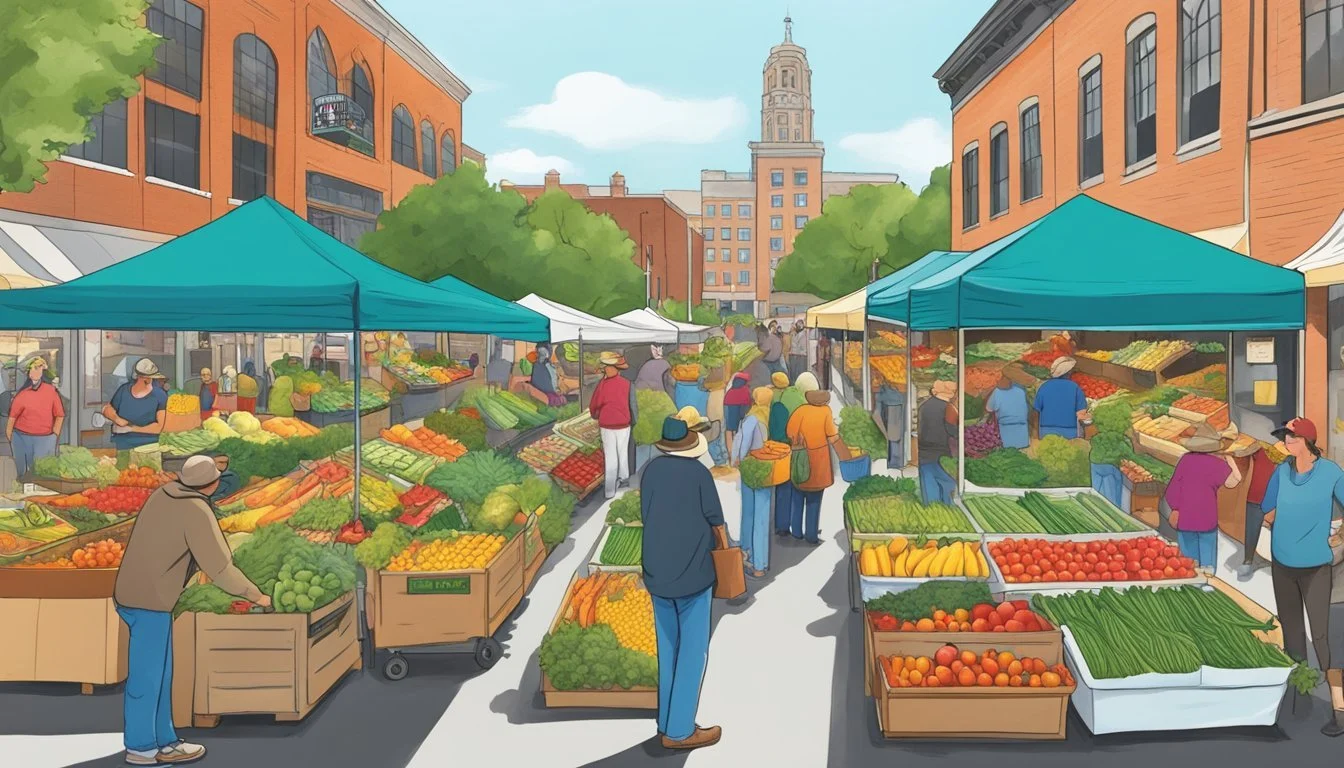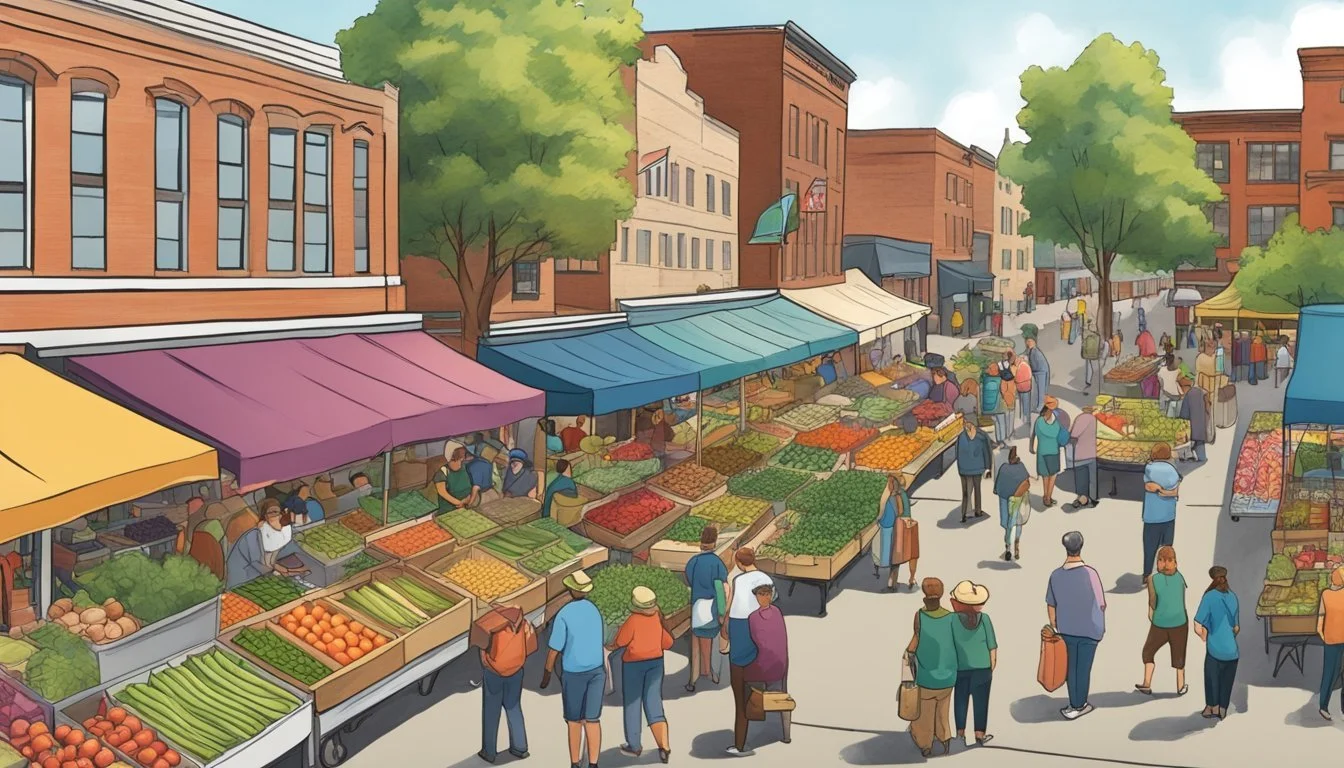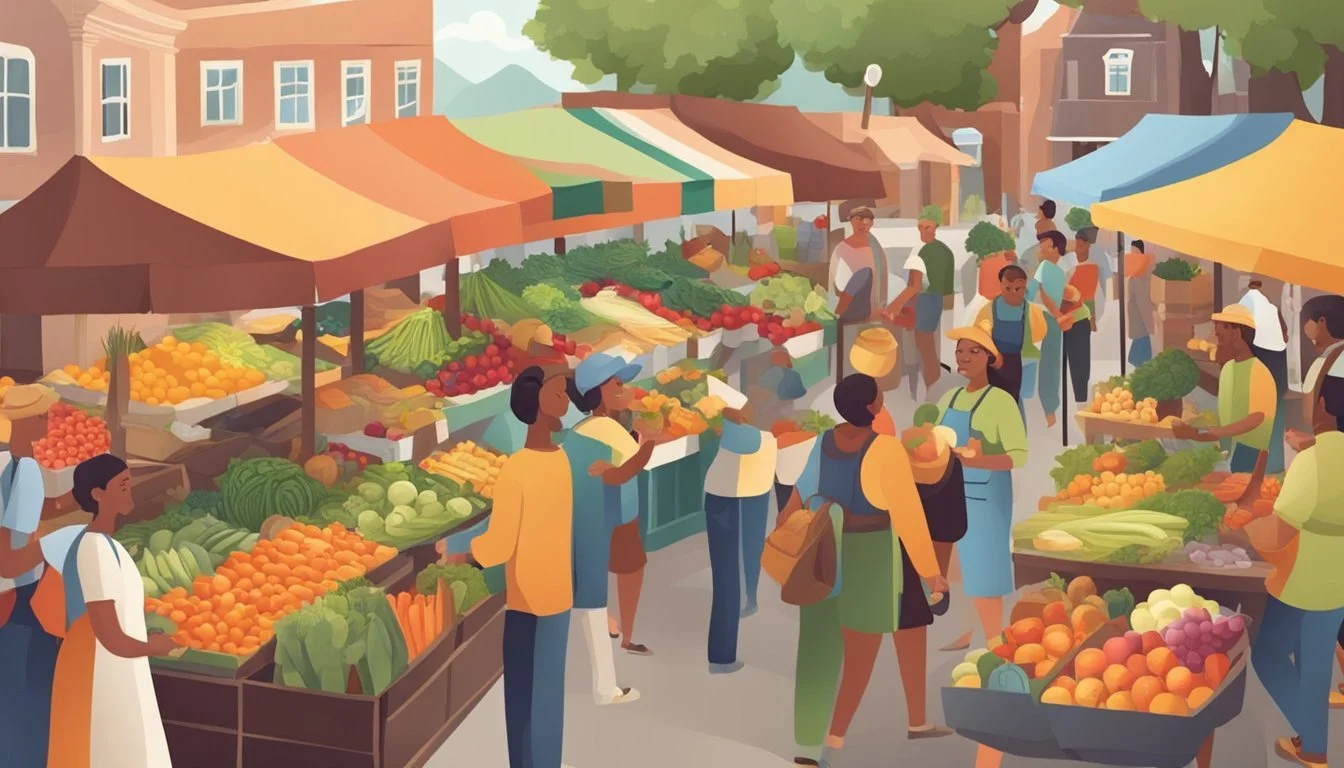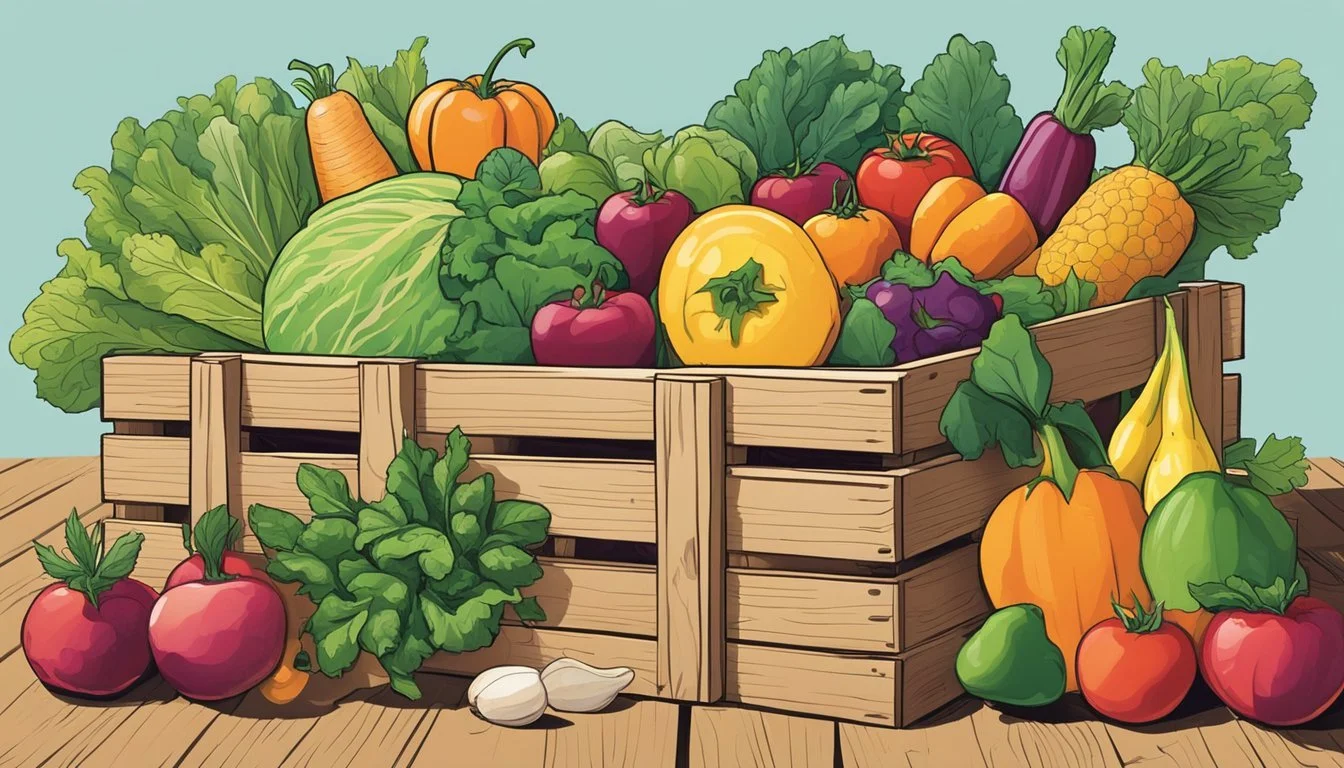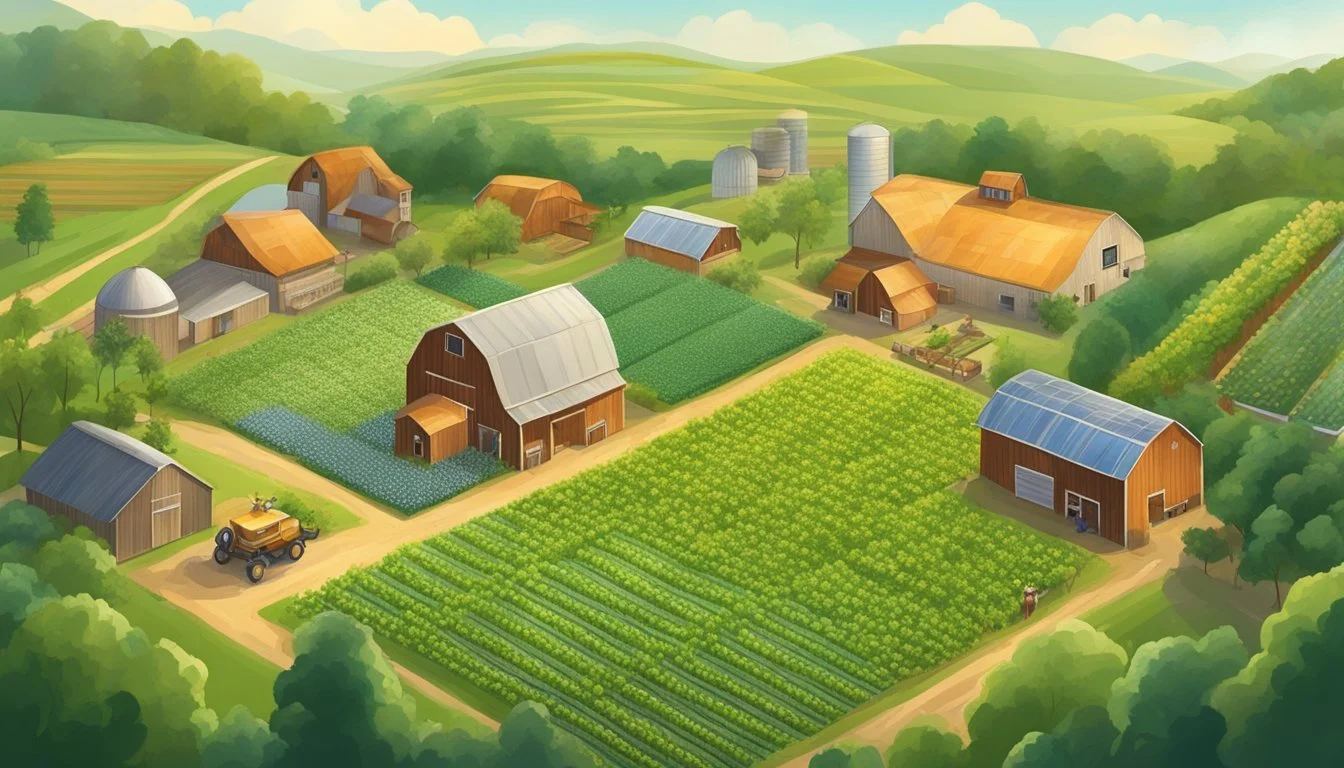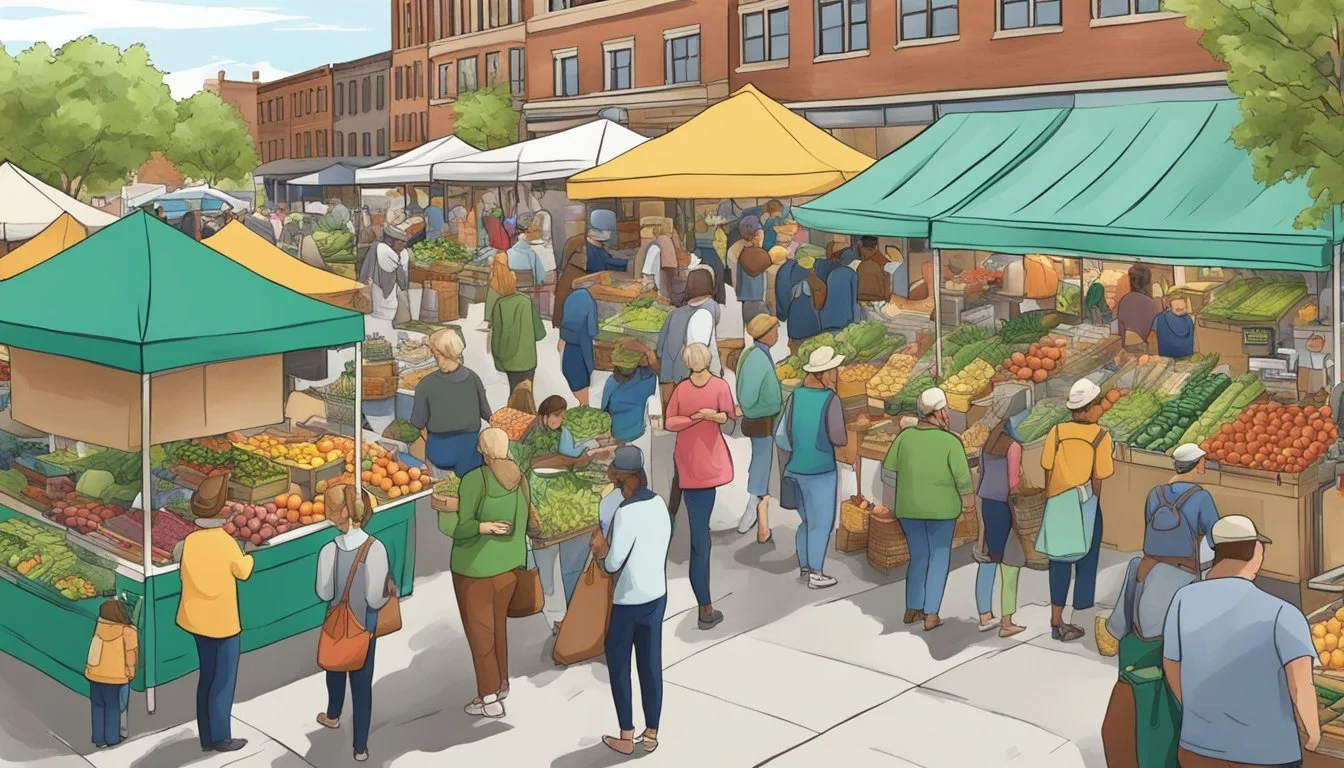Community Supported Agriculture (CSA) in Ann Arbor, MI
A Guide to Local Farm Partnerships
Community Supported Agriculture (CSA) has taken root in Ann Arbor, MI, as a popular model for local food distribution, connecting consumers directly with farms. This system allows residents to purchase seasonal produce shares from local farms, ensuring they receive fresh, locally grown fruits and vegetables throughout the farming season. Ann Arbor's embrace of CSA highlights the community's dedication to sustainable agriculture and support for local farmers.
Farms near Ann Arbor offer CSA programs that range in variety and size, catering to individuals and families. Participants in these programs typically pay upfront for a share of the anticipated harvest, which provides the farmers with needed capital at the start of the growing season. In return, members of the CSA receive weekly or bi-weekly allotments of farm products including vegetables, fruits, herbs, and sometimes even eggs and dairy products.
The success of CSA programs in Ann Arbor is evident in the diversity and longevity of the offerings. Frog Holler Farm, for instance, provides organic culinary vegetables and herbs and has been a staple at the Ann Arbor Farmer’s Market since 1974. Similarly, Tantré Farm markets a share of their products directly to the community at local distribution sites in Chelsea, Ann Arbor, and Plymouth. Through these CSA programs, the symbiotic relationship between local Ann Arbor farmers and consumers is strengthened, ensuring a viable market for small-scale agriculture and access to nutritious food for the community.
Understanding CSA
Community Supported Agriculture (CSA) represents a partnership between local farmers and community members, offering a direct channel through which consumers purchase seasonal produce in the form of shares.
Community Supported Agriculture Basics
A CSA operates on the principle of pre-paid produce shares. Members, or share-holders, invest in a farm's production at the beginning of the growing season and in return, they regularly receive a portion of the farm's harvest. This model provides farmers with upfront capital to cover the initial costs of the growing season such as seeds and equipment.
The Role of CSA in Sustainable Agriculture
Community Supported Agriculture emphasizes local, sustainable operations. By reducing transportation needs and encouraging eco-friendly farming practices, CSAs play a pivotal role in lowering carbon footprints and supporting local economies. Subscribers to a CSA typically receive a diversity of seasonal produce, which encourages a more environmentally responsible food system.
Types of CSA Models
CSAs near Ann Arbor, MI, following the national practice, offer a variety of models tailored to different consumer needs:
Traditional CSA: Shareholders receive a predetermined box of seasonal produce throughout the subscription period.
Market-Style CSA: Members choose a certain amount of produce from a larger selection, often at a designated pickup location like a farmer's market.
By understanding these facets of Community Supported Agriculture, individuals looking for fresh, local produce in Ann Arbor can make informed decisions about supporting sustainable agriculture in their community.
Local CSA Farms
Ann Arbor, Michigan, serves as a rich hub for Community Supported Agriculture (CSA), with local farms offering fresh, organic produce directly to consumers. These farms are at the forefront of promoting sustainable agriculture in the region and providing community members with opportunities to partake in locally sourced food.
Tantre Farm Profile
Tantre Farm has etched its place in the Ann Arbor community as a stalwart for organic farming. Established in 1993, the farm extends over a sprawling 40 acres, diversifying its crops to meet the community's demand for organic produce. CSA members receive a weekly share of vegetables, fruits, and herbs, featuring over 50 types of vegetables and 25 varieties of herbs and flowers. They stand out for their commitment to sustainable farming practices, enriching the local ecosystem.
Country Valley Farms Overview
Country Valley Farm prides itself on being a certified organic family-owned entity. Since its inception in November 2017, the farm has adhered to regenerative agricultural practices. It places a significant emphasis on maintaining a symbiotic relationship with the local wildlife and nature. Known for its healthy food produce, Country Valley Farm is a testament to the passion and dedication of the local farmers in supporting the land.
Old Pine Farm Offerings
Situated near Ann Arbor, Old Pine Farm operates with a core philosophy of fostering close relationships with community members through their farming endeavors. This farm offers a variety of vegetables, fruits, and occasionally, flowers. Patrons of the farm can expect produce grown with meticulous care, reflecting the farmer’s dedication to quality and sustainability. Old Pine Farm represents a slice of the broader network of CSAs that allow for a richer, locally-focused food landscape.
Becoming a CSA Member
Community Supported Agriculture in Ann Arbor offers individuals an opportunity to be part of a sustainable food initiative and engage directly with local farming practices. They can gain access to fresh, organic produce while supporting the livelihood of local farmers.
How to Join a CSA
To become a member of a CSA in Ann Arbor, one typically browses local CSA options such as Frog Holler Farm, The Community Farm of Ann Arbor, or Tantré Farm. Community members examine different CSAs based on factors like farm practices, produce variety, and pickup locations. Interested individuals can then sign up for membership, usually by purchasing a seasonal "share" at the beginning of the growing season. This upfront investment helps farmers cover the initial costs for seeds, equipment, and labor.
Steps to Join:
Research local CSA options and choose one that fits your needs.
Purchase a seasonal share from the farm's available options.
Stay informed about pickup times and locations established by the CSA.
Membership Benefits and Responsibilities
CSA membership entitles members to a weekly box of fresh, seasonal produce. This mutually beneficial arrangement fosters a relationship between consumers and the farmers who grow their food. However, there are also responsibilities that come with being a CSA member, such as understanding the risks of farming where there might be a variable yield due to weather conditions or pest issues.
Membership Benefits:
Access to fresh, organic produce throughout the season.
Knowing that you're directly supporting local agriculture and sustainable practices.
Member Responsibilities:
Share the risks of farming, accepting the possibility of fluctuating weekly bounty.
Commit to the entire season, providing financial stability for the farmers.
Understanding CSA Shares
A "share" in CSA terms usually equates to a portion of the farm's harvest over a designated period, such as the entire growing season. There are different sizes of shares available, catering to various household needs, from small (1-2 people) to large (3-6 people).
Example of Share Sizes:
Small Share: Suitable for 1-2 people.
Medium Share: Ideal for 2-4 people.
Large Share: Ample for 3-6 people.
Members usually receive their shares weekly and the content of these shares changes throughout the season based on what is in peak harvest. This system encourages a varied diet that is in tune with the local growing season.
CSA Seasonal Produce
Community Supported Agriculture (CSA) in Ann Arbor offers a variety of seasonal produce that provides community members with fresh, organic vegetables and fruits. These offerings vary as the seasons change, ensuring a diverse selection of crops throughout the year.
Summer Harvest
During the summer, CSAs in Ann Arbor thrive with an abundance of fresh produce. Members can expect a vibrant selection of vegetables such as tomatoes, cucumbers, and bell peppers. The summer fruit selection often includes blueberries, strawberries, and melons, reflecting the richness of the season.
Vegetables: Tomatoes, Cucumbers, Zucchini, Bell Peppers, Corn
Fruits: Strawberries, Blueberries, Raspberries, Melons
Autumn Bounty
As fall approaches, the harvest shifts to heartier produce. Autumn’s bounty features root vegetables like carrots and sweet potatoes, as well as squashes such as butternut and acorn. These hearty vegetables are perfect for warming dishes as the temperature drops.
Vegetables: Carrots, Beets, Sweet Potatoes, Winter Squash
Fruits: Apples, Pears
Spring Offerings
In spring, the soil awakens with a different array of produce. This season is known for tender, leafy greens like spinach and kale, which are some of the first to appear. Spring also welcomes radishes and snap peas, adding a crisp, fresh taste.
Vegetables: Spinach, Kale, Radishes, Snap Peas
Herbs: Parsley, Cilantro
Each season offers its unique contribution to CSA boxes, reflecting the natural growing cycles and sustainable farming practices prevalent in Ann Arbor's local food ecosystem.
Organic and Biodynamic Farming
In Ann Arbor, MI, Community Supported Agriculture (CSA) farms employ extensive organic and biodynamic farming techniques to promote soil health and biodiversity on their lands.
Certified Organic Practices
Certified organic farms around Ann Arbor adhere to strict guidelines that prohibit the use of synthetic pesticides and fertilizers. These practices are in place to maintain soil integrity and produce healthier crops. For instance, the Brooklyn-based Frog Holler Farm and Country Valley Farm have embraced organic cultivation, focusing on a diverse range of vegetables, herbs, and stewardship of the land.
Biodynamic Farming Methods
Biodynamic farming methods integrate organic practices with a holistic approach to agriculture. At locations like the Community Farm of Ann Arbor, biodynamic principles have guided farming for over 30 years, producing a wide array of heirloom vegetables and fruit trees. This method emphasizes the farm as a living organism and utilizes preparations made from fermented manure, herbs, and minerals to enrich the soil and support plant growth.
Permaculture Techniques
Permaculture is a system of regenerative agriculture design that mirrors natural ecosystems, aiming to create sustainable and self-sufficient landscapes. Permaculture techniques often complement both organic and biodynamic practices, aiming to maximize the functionality and health of the land. They focus on the careful placement of plants, water management, and soil building to create a thriving agricultural environment without depleting the earth's resources.
Additional Offerings
In Ann Arbor, Community Supported Agriculture programs provide more than just vegetables. Subscribers can enjoy a range of locally produced goods, from fresh eggs to aromatic herbs.
Eggs, Meat and Dairy
Many CSAs in Ann Arbor offer eggs from free-range chickens, providing a weekly source of fresh and nutritious eggs. For meat, small-scale local farms may offer a variety of options, including grass-fed beef, pastured pork, and free-range poultry. Some CSAs also have dairy offerings, like milk, cheese, and yogurt, all sourced from local dairy farms known for their quality and animal welfare standards.
Eggs: Available from free-range chickens.
Meat: Variety includes beef, pork, and poultry.
Dairy: Milk, cheese, yogurt from local dairies.
Herbs, Flowers and Specialty Crops
In addition to traditional produce, local CSA programs include a splendid array of herbs and flowers, which are great for culinary use and ornamental purposes. Specialty crops may include heirloom varieties and exotic vegetables that are seldom found in regular markets. These unique offerings allow consumers to explore new flavors and support biodiversity.
Herbs: Culinary and medicinal uses.
Flowers: Cut flowers for décor or special events.
Specialty Crops: Heirloom varieties and exotic vegetables.
Wholesale and Restaurant Partnerships
Ann Arbor CSAs have established wholesale partnerships, distributing fresh goods to local grocers and food co-ops. They also collaborate with local restaurants to supply chefs with fresh, seasonal ingredients, which helps to foster a strong local food economy. These partnerships emphasize the benefits of farm-to-table practices, ensuring quality and freshness in the culinary scene.
Wholesale: Local grocers and co-ops.
Local Restaurants: Supplying chefs with seasonal ingredients.
CSA Logistics
Community Supported Agriculture in Ann Arbor, Michigan, operates through a well-established network ensuring members receive their weekly share of fresh, local produce throughout the growing season. Attention to detail in these logistical aspects is critical for the success of both vegetable CSA programs and local farms participating in CSAs.
Distribution and Pick-Up Points
Local farms typically offer a variety of distribution points for their CSA members. Frog Holler Farm, for instance, has had a stall at the Ann Arbor Farmer's Market since 1974, where CSA shares may be picked up. Additionally, farms like Good Neighbor Farm on 4400 Pontiac Trail also facilitate CSA pick-ups directly at the farm, providing convenience for both the farmer and the members. During the growing season, which in this region can extend beyond the traditional summer months, CSA members are informed of specific days and hours when they can collect their shares from the designated points.
Pick-up examples include:
Frog Holler Farm: Ann Arbor Farmer's Market.
Good Neighbor Farm: On-farm pick-up at 4400 Pontiac Trail.
Packaging and Transport
Effective packaging and transport are crucial to maintain the quality of produce from the farm to the table. Farms implement eco-friendly and efficient ways to package their weekly CSA shares, keeping produce as fresh as possible. Some even offer reusable bags or containers to minimize waste. In terms of transport, farms are responsible for ensuring that the produce reaches the distribution points in a timely manner. This sometimes involves refrigerated transport or other methods to keep vegetables fresh, particularly during the warmer parts of the season.
Packaging Practices:
Reusable containers or bags to minimize environmental impact.
Proper insulation or refrigeration during transport, depending on produce needs.
Community and Education
Ann Arbor's CSA programs intertwine the fabric of community engagement with agricultural education. They proactively offer educational workshops and foster a culture of learning alongside community-based celebrations.
Educational Programs and Workshops
CSAs in Ann Arbor facilitate a range of educational initiatives that connect individuals with the sources of their food. These programs not only impart knowledge on sustainable farming practices but also enhance participants' understanding of local food systems. Workshops cover various topics from organic gardening techniques to food preservation. They often include:
On-farm experiences: Hands-on farming activities provide an immersive understanding of agriculture.
Cooking classes: Led by experts, these sessions focus on preparing meals using locally sourced ingredients.
Community Events and Festivals
CSAs serve as vibrant hubs for community events and festivals in Ann Arbor. They are instrumental in orchestrating gatherings that celebrate the region's rich agricultural heritage. Events typically include:
Harvest festivals: Marking the end of growing seasons with festivities that bring together CSA members and the wider community.
Seasonal markets: Where CSA members can collect their shares and local artisans can showcase their crafts.
These community events foster a deep sense of togetherness and appreciation for the local food ecosystem, reinforcing the bonds between growers and consumers.
Challenges and Opportunities
In Ann Arbor, MI, the Community Supported Agriculture (CSA) system encounters unique challenges and opportunities, shaping the sustainability and growth of local food systems. From the environmental impact to financial stability, each aspect plays a pivotal role in defining the trajectory of CSAs.
Environmental Impact and Climate Challenges
Climate Change: The increasingly unpredictable weather patterns pose a significant threat to Ann Arbor CSAs, challenging their ability to plan and harvest reliably.
Drought and Flooding: These extreme weather conditions can lead to crop failures, affecting both yield and quality.
Opportunities:
Adaptation: By cultivating drought-resistant crops and improving soil health, CSAs can better withstand adverse conditions.
Innovation: Implementing water-saving techniques and renewable energy can mitigate some of the environmental impacts.
Economic Considerations and CSA Viability
Economic Pressures: Ann Arbor CSAs face financial challenges such as:
High operational costs
Competition from larger producers
Opportunities:
Direct Sales: By eliminating middlemen, CSAs can maintain a fair pricing structure and close consumer relationships.
Community Engagement: Increased local support for CSAs has presented an opportunity for financial stability and growth through consumer education and community-centric models.
By addressing these challenges with innovative solutions, Ann Arbor's CSAs can leverage their opportunities to foster a more resilient food system.
Emerging Trends in CSA
Community Supported Agriculture in the Ann Arbor area is witnessing a shift as it adapts to meet new challenges and consumer demands. These changes are most evident in two key areas: innovations within CSA farming practices and the expansion of CSA operations into urban territories, including places like Ann Arbor and neighboring Ypsilanti.
Innovations in CSA Farming
CSA farms around Ann Arbor are embracing novel approaches to enhance their productivity and appeal to a wider market. Technology plays a crucial role, with farms integrating digital platforms for simplifying subscription models and streamlining distribution. Farming methods too are seeing advancements; cover cropping and precision agriculture are increasingly utilized to manage soil health and crop yields effectively.
Another trend is diversification of produce. Farmers are not only increasing the variety of crops grown but are also offering value-added products like jams, bread, and pickled goods. Local CSA farms are tapping into the community engagement aspect by organizing events and workshops, turning the CSA experience into a participative journey rather than just a transaction.
Expansion into Urban Areas
Proximity to urban settings has aided CSA in growing beyond rural roots. In Ann Arbor and Ypsilanti, urban CSAs are blossoming, allowing residents easier access to fresh, local produce:
Urban Farm Locations: Vacant lots and community gardens are being converted into productive land.
Partnerships with Urban Businesses: CSAs are partnering with local businesses to create pick-up points closer to where people live and work.
Educational Outreach: They organize urban farming education programs, increasing agricultural awareness and consumer interest.
By making strides into urban regions, CSAs are efficiently closing the gap between city dwellers and their understanding of agriculture, while enhancing the local food system's sustainability.

